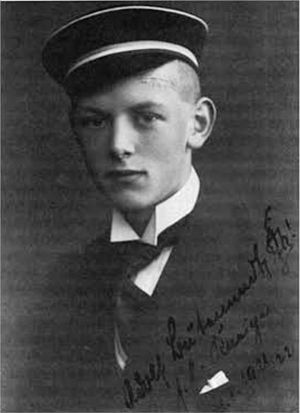Adolf Butenandt facts for kids
Quick facts for kids
Adolf Butenandt
|
|
|---|---|

Adolf Friedrich Johann Butenandt in 1921
|
|
| Born | 24 March 1903 |
| Died | 18 January 1995 (aged 91) |
| Nationality | German |
| Awards | Nobel Prize for Chemistry (1939) Kriegsverdienstkreuz (1942) |
| Scientific career | |
| Fields | Organic and biochemistry |
| Institutions | Kaiser Wilhelm Institute / Max Planck Institute for Biochemistry Technical University of Danzig |
| Thesis | Untersuchungen über das Rotenon, den physiologisch wirksamen Bestandteil der Derris elliptica (1928) |
| Doctoral advisor | Adolf Windaus |
Adolf Friedrich Johann Butenandt (24 March 1903 – 18 January 1995) was a German biochemist. He won the Nobel Prize in Chemistry in 1939 for his important "work on sex hormones." At first, he couldn't accept the award because of government rules. But he was able to accept it in 1949, after World War II ended. He was also the President of the Max Planck Society from 1960 to 1972.
Early Life and Studies
Adolf Butenandt was born in Lehe, a town near Bremerhaven, Germany. He began his university studies at the University of Marburg. Later, he joined the research group of Adolf Windaus at the University of Göttingen. Windaus was a Nobel Prize winner himself.
Butenandt finished his studies in 1927, earning a PhD in chemistry. His research for his PhD was about a natural bug killer called rotenone. This substance is found in the roots of a plant called Derris elliptica. He was able to separate and study this chemical. After more advanced studies, he became a lecturer in Göttingen in 1931.
Working as a Scientist
In 1933, Butenandt became a professor at the Technical University of Danzig. During this time, he signed a statement of loyalty to Adolf Hitler. In 1936, he joined the Nazi Party. He also became the director of the Kaiser Wilhelm Institute for Biochemistry in Berlin. His work on rotenone was seen as useful by the Nazi government. They thought it could help control lice among soldiers.
Butenandt's main work was on hormones. With advice from Adolf Windaus and Walter Schöller, he started studying hormones found in ovaries. This led to a big discovery: he found estrone and other important female sex hormones. He got these hormones from many liters of urine.
While he was a professor in Danzig, he kept working on hormones. In 1934, he found progesterone. A year later, in 1935, he found testosterone. These discoveries, along with similar work by Leopold Ružička, were so important that they led to him winning the Nobel Prize in 1939.
After World War II, in 1945, his institute moved to Tübingen. Butenandt became a professor at the University of Tübingen. In 1956, the institute moved again to Martinsried, near Munich. He then became a professor at the University of Munich.
From 1960 to 1972, Butenandt was the president of the Max Planck Society. This is a very important science organization in Germany. He took over this role from another famous scientist, Otto Hahn.
In 1959, Butenandt also discovered and named a special chemical called Bombykol. This chemical is a pheromone that silkworm moths use to communicate.
Adolf Butenandt passed away in Munich in 1995, at the age of 91. His wife, Erika, also passed away in 1995.
Awards and Recognition
Adolf Butenandt received many awards for his scientific work:
- 1939: The Nobel Prize in Chemistry. He shared this prize with Leopold Ruzicka. They won it for finding and identifying sex hormones like oestrogen, progesterone, and androsterone.
- 1942: War Merit Cross, Second Class (Germany)
- 1943: War Merit Cross, First Class (Germany)
- 1953: Paul Ehrlich and Ludwig Darmstaedter Prize
- 1959: Grand Merit Cross with Star and Sash of the Federal Republic of Germany
- 1960: Honorary Citizen of the City of Bremerhaven
- 1962: Bavarian Order of Merit
- 1962: Pour le Mérite
- 1964: Austrian Decoration for Science and Art
- 1969: Commander of the French Legion of Honour
- 1985: Grand Cross of Merit of the Federal Republic of Germany
- 1985: Honorary Citizen of the City of Munich
- 1994: Grand Gold Decoration for Services to the Republic of Austria
- He attended the Lindau Nobel Laureate Meetings 31 times, which is a record.
- He was made an Honorary President of the Max Planck Society.
- He received many honorary doctorates from universities around the world.
See also
 In Spanish: Adolph Butenandt para niños
In Spanish: Adolph Butenandt para niños
- Androsterone
- Conjugated estriol
- Epiandrosterone
- Pregnenolone
 | Aaron Henry |
 | T. R. M. Howard |
 | Jesse Jackson |


